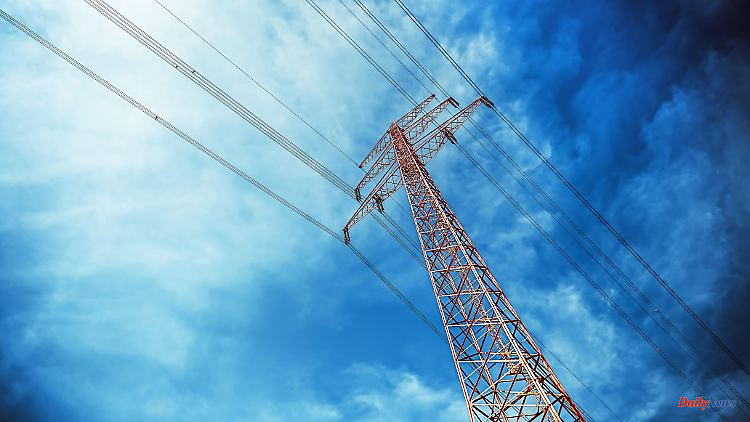The Bundestag and Council have approved the price brakes for gas and electricity. In an interview with ntv.de, Tobias Federico, Managing Director of the consulting firm Energy Brainpool, explains which prices electricity customers have to reckon with now and in the future, why the danger of a blackout has not been averted and how likely brownouts are.
ntv.de: How will the price of electricity continue to develop?
Tobias Federico: Wholesale prices are still relatively high at the moment. If electricity and gas are bought now, the price brake will take effect. Depending on the weather, there are two options for the coming year: you remain at the high level, but do not increase exorbitantly; the electricity price brake would then apply until its planned end in April 2024. Or we can get through this winter with our gas reserves. If the stores are still more than 40 percent full in April, the market will relax. Uncertainty factors would then remain, but prices would probably fall well below a level at which the price brake is necessary. However, utilities buy several years in advance for electricity and natural gas customers. The high prices from 2022 will continue into 2024, so to speak, and are reflected in the end customer tariffs. That is why the electricity and gas price brake must definitely remain in place until April 2024.
The agreed price brakes are intended to protect customers from excessive burdens. On the other hand, isn't there a risk that the price will be kept artificially high as a result?
There is great concern that providers are not cost-oriented when setting prices, there is a risk of abuse. After all, the state reimburses them for the difference between the fixed 40 cents per kilowatt hour of electricity and the working price they demand. The Federal Cartel Office should check that. The danger is there. But there are always black sheep, so abuse does not have to take place across the board. Now it simply has to be checked whether the prices charged are justified by the high procurement costs of the providers or not.
Many customers are confronted with such drastic price increases that they terminate their contract at the turn of the year and switch providers. Is it worth taking out a special tariff at the moment, or does it make more sense to settle for the basic service first and wait and see how prices develop?
Going back to primary care is definitely an option. Affected consumers must compare prices. The prices for basic services can also change. In many cases, however, this can make sense because many providers are currently not accepting any new customers.
What electricity prices do consumers who do not have a contract with a price guarantee currently have to expect?
That depends heavily on how the energy suppliers have made their purchases. If you have bought for the long term, the price should be around 35 to 40 cents per kilowatt hour. However, it also depends heavily on charges that vary in amount, such as network charges. It should be 18 to 20 cents net, plus taxes, levies and VAT.
What about new contracts?
Since the providers did not expect new customers in the long term and therefore could not buy for them in the long term, a kilowatt hour currently costs 50 to 60 cents here.
More gas is currently being converted into electricity, there is a dark doldrums, so coal bottlenecks are already threatening, but on the other hand France is gradually ramping up its nuclear power plants again, and Germany is leaving three nuclear power plants and coal-fired power plants longer on the grid. How big do you currently estimate the risk of blackouts?
A blackout could occur under two basic conditions: if France has technical problems and, secondly, it is cold both there and in Germany at the same time. But if France continues to ramp up its nuclear power plants according to plan, I no longer see this danger. Things are looking good at the moment, the market is already relaxing. With that in mind, I think blackouts are unlikely this winter unless something unforeseen happens in France. Nevertheless, I think blackouts are possible: as a result of acts of sabotage against our critical infrastructure.
Do we actually have to export our electricity to France if we are threatened with a bottleneck?
We have a European network system, we help each other in all kinds of situations. There is no prioritization that a country would isolate itself if it had an export problem. If we are at risk of a bottleneck, it may still be the case that we help out elsewhere. Because in addition to the idea of solidarity, the network operators are responsible for stable network operation throughout Europe. In a shortage situation, they have the power to decide how to keep the overall system stable. The four German network operators exchange information with the French, and then negotiations begin. If failure is unavoidable, choose the area with the least damage.
How likely are brownouts, i.e. the targeted, temporary disconnection of individual regions or large consumers from the power grid in order to keep the grid stable and thus prevent a blackout?
Here, too, I think the probability is very low. However, it is higher than in previous years. Brownouts are obviously more likely than blackouts, but if we were to take bets I'd bet we'd get through the winter without brownouts and blackouts.
Are all regions equally at risk?
Depending on nature, the suppliers already have special network areas in mind that would have to be switched off in the event of a brownout. But they are not public.
What has become of the specter of the fan heater? At the moment, given the gas supply, it doesn't look as if they will be needed. But what if they were used en masse?
If we get a gas shortage, they would be an added element of uncertainty. In my estimation, however, the risk of them causing a brownout or blackout is in the per thousand range.
Christina Lohner spoke to Tobias Federico












